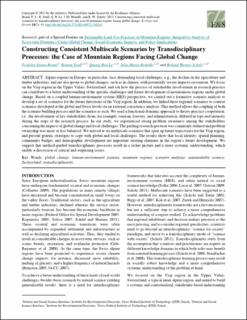Please use this identifier to cite or link to this item:
https://doi.org/10.21256/zhaw-18092Full metadata record
| DC Field | Value | Language |
|---|---|---|
| dc.contributor.author | Brand, Fridolin S. | - |
| dc.contributor.author | Seidl, Roman | - |
| dc.contributor.author | Le, Quang Bao | - |
| dc.contributor.author | Brändle, Julia Maria | - |
| dc.contributor.author | Scholz, Roland Werner | - |
| dc.date.accessioned | 2019-09-05T09:50:34Z | - |
| dc.date.available | 2019-09-05T09:50:34Z | - |
| dc.date.issued | 2013-06-01 | - |
| dc.identifier.issn | 1708-3087 | de_CH |
| dc.identifier.uri | https://digitalcollection.zhaw.ch/handle/11475/18092 | - |
| dc.description.abstract | Alpine regions in Europe, in particular, face demanding local challenges, e.g., the decline in the agriculture and timber industries, and are also prone to global changes, such as in climate, with potentially severe impacts on tourism. We focus on the Visp region in the Upper Valais, Switzerland, and ask how the process of stakeholder involvement in research practice can contribute to a better understanding of the specific challenges and future development of mountainous regions under global change. Based on a coupled human-environment system (HES) perspective, we carried out a formative scenario analysis to develop a set of scenarios for the future directions of the Visp region. In addition, we linked these regional scenarios to context scenarios developed at the global and Swiss levels via an external consistency analysis. This method allows the coupling of both the scenario building process and the scenarios as such. We used a functional-dynamic approach to theory-practice cooperation, i.e., the involvement of key stakeholders from, for example, tourism, forestry, and administration, differed in type and intensity during the steps of the research process. In our study, we experienced strong problem awareness among the stakeholders concerning the impacts of global change and local challenges. The guiding research question was commonly defined and problem ownership was more or less balanced. We arrived at six multiscale scenarios that open up future trajectories for the Visp region, and present generic strategies to cope with global and local challenges. The results show that local identity, spatial planning, community budget, and demographic development are important steering elements in the region’s future development. We suggest that method-guided transdisciplinary processes result in a richer picture and a more systemic understanding, which enable a discussion of critical and surprising issues. | de_CH |
| dc.language.iso | en | de_CH |
| dc.publisher | Resilience Alliance | de_CH |
| dc.relation.ispartof | Ecology and Society | de_CH |
| dc.rights | Licence according to publishing contract | de_CH |
| dc.subject.ddc | 306: Kultur | de_CH |
| dc.title | Constructing consistent multiscale scenarios by transdisciplinary processes : the case of mountain regions facing global change | de_CH |
| dc.type | Beitrag in wissenschaftlicher Zeitschrift | de_CH |
| dcterms.type | Text | de_CH |
| zhaw.departement | School of Management and Law | de_CH |
| zhaw.organisationalunit | International Management Institute (IMI) | de_CH |
| dc.identifier.doi | 10.5751/ES-04972-180243 | de_CH |
| dc.identifier.doi | 10.21256/zhaw-18092 | - |
| zhaw.funding.eu | No | de_CH |
| zhaw.issue | 2 | de_CH |
| zhaw.originated.zhaw | Yes | de_CH |
| zhaw.publication.status | publishedVersion | de_CH |
| zhaw.volume | 18 | de_CH |
| zhaw.publication.review | Peer review (Publikation) | de_CH |
| zhaw.author.additional | No | de_CH |
| Appears in collections: | Publikationen School of Management and Law | |
Files in This Item:
| File | Description | Size | Format | |
|---|---|---|---|---|
| Constructing consisten multiscale scenarios.pdf | 1.59 MB | Adobe PDF |  View/Open |
Show simple item record
Brand, F. S., Seidl, R., Le, Q. B., Brändle, J. M., & Scholz, R. W. (2013). Constructing consistent multiscale scenarios by transdisciplinary processes : the case of mountain regions facing global change. Ecology and Society, 18(2). https://doi.org/10.5751/ES-04972-180243
Brand, F.S. et al. (2013) ‘Constructing consistent multiscale scenarios by transdisciplinary processes : the case of mountain regions facing global change’, Ecology and Society, 18(2). Available at: https://doi.org/10.5751/ES-04972-180243.
F. S. Brand, R. Seidl, Q. B. Le, J. M. Brändle, and R. W. Scholz, “Constructing consistent multiscale scenarios by transdisciplinary processes : the case of mountain regions facing global change,” Ecology and Society, vol. 18, no. 2, Jun. 2013, doi: 10.5751/ES-04972-180243.
BRAND, Fridolin S., Roman SEIDL, Quang Bao LE, Julia Maria BRÄNDLE und Roland Werner SCHOLZ, 2013. Constructing consistent multiscale scenarios by transdisciplinary processes : the case of mountain regions facing global change. Ecology and Society. 1 Juni 2013. Bd. 18, Nr. 2. DOI 10.5751/ES-04972-180243
Brand, Fridolin S., Roman Seidl, Quang Bao Le, Julia Maria Brändle, and Roland Werner Scholz. 2013. “Constructing Consistent Multiscale Scenarios by Transdisciplinary Processes : The Case of Mountain Regions Facing Global Change.” Ecology and Society 18 (2). https://doi.org/10.5751/ES-04972-180243.
Brand, Fridolin S., et al. “Constructing Consistent Multiscale Scenarios by Transdisciplinary Processes : The Case of Mountain Regions Facing Global Change.” Ecology and Society, vol. 18, no. 2, June 2013, https://doi.org/10.5751/ES-04972-180243.
Items in DSpace are protected by copyright, with all rights reserved, unless otherwise indicated.